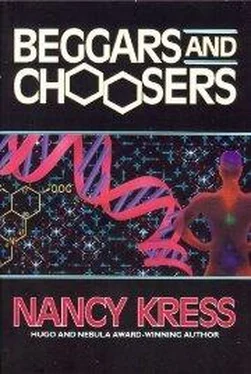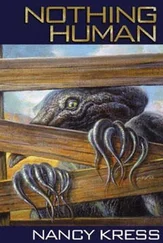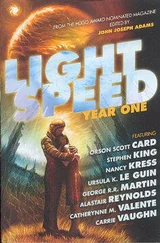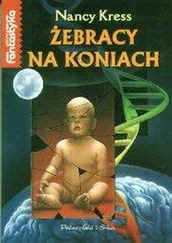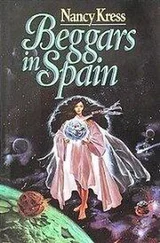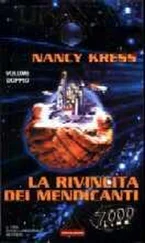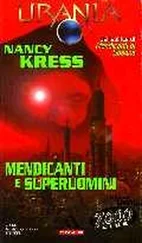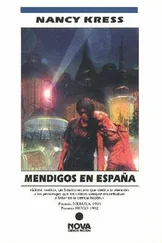Peg shoved my chair against a table, brought me a bowl of stew, and settled down to watch the scooter race. Her huge body dwarfed the standard-issue plastisynth chair.
I watched the race, while observing everything through the zoom area of my corneas. Abby’s lace was covered with a complex design of small oblongs, no two the same, like snowflakes. She snipped out an oblong and presented it, laughing, to Joncey. Three men played cards; the one whose hand I could see held a pair of kings. After a while I said to Peg, “Is this how you spend all your days? Contributing to the revolution?”
“Shut up, you.”
“I want to see more of the compound. Hubbley said I could if you take me.”
“Say ‘Colonel Hubbley,’ you!”
“Colonel Hubbley, then.”
She seized my chair hard enough to rattle my teeth and shoved it along the nearest corridor. “Hey! Slow down!”
She slowed to an insolent crawl. I didn’t argue. I tried to memorize everything.
It wasn’t easy. The tunnels all looked the same: featureless white, nanoperfect, lined with dirt-resistant alloy and identical white, unmarked doors. I tried to memorize tiny bits of dropped food, boot scuffs. Once I saw a small oblong bit of lace half caught under a door, and I knew Abigail must have come that way. Peg pushed me like a ’bot, impassive and tireless. I was losing track of what I’d tried to memorize.
After three hours, we passed a cleaning ’bot, whirling up the things I had used as markers.
In the whole tour, I saw only two open doors. One was to a common bath. The other was only opened for a moment, then closed, allowing the fastest glimpse of high-security cannisters, rows and rows of them. Duragem dissemblers? Or some other nonhuman-genome destruction that Jimmy Hubbley thought ought to be unleashed on his enemies?
“What was that?” I said to Peg.
“Shut up, you.”
An hour later, we returned to the commons area. Lunch was still in progress. Peg shoved me to an empty table and plunked another bowl of stew in front of me. I wasn’t hungry.
A few minutes later Jimmy Hubbley sat down with me. “Well, son, I hope y’all are satisfied with your tour.”
“Oh, it was great,” I said. “I saw all kinds of contributions to the revolution.”
He laughed. “Oh, it’s happenin’, all right. But y’all ain’t goin’ to provoke me into showing y’all before I’m ready. Time enough, time enough.”
“Aren’t you afraid your troops will get restless, doing nothing like this? What did General Marion do with his men between battles?” I put down my spoon; I hated him too much to even pretend to eat in his presence. God, I wanted a drink.
He seemed surprised. “Why, Mr. Arlen, sir, they don’t ordinarily do nothin’. This here’s Sunday, the Sabbath. Come tomorrow, we go back to regular drill. General Marion knew the value of a day for rest and recuperation of the human spirit.”
He looked around with satisfaction at the desultory gambling, scooter watching, slumped figures probably on sunshine. Only three faces in the whole damn room showed any real animation.
Joncey and Abigail, smiling at each other, Abby still sewing on billowing patterned lace. And Peg.
“Eat your stew, son,” Hubbley said kindly. “Y’all will need food to keep your strength up.”
I left my spoon where it lay. “No,” I said. “I won’t.” Of course he didn’t understand that. But Peg, with animal alertness, caught something in my tone. She looked at me hard, before she went back to watching Jimmy Hubbley, her sullen face transformed by awe and respect and the hopeless, longing love of an ordinary person for one clearly as far above her as a god.
The test of our progress is not whether we add more to the abundance of those who have much; it is whether we provide enough for those who have too little.
—Franklin Delano Roosevelt, Second Inaugural Address
DIANA COVINGTON: EAST QUANTA
The most remarkable thing about being in an off-line dump like East Oleanta was my realization that the GSEA didn’t know where Miranda Sharifi was. They were a sophisticated and determined agency, but apparently they didn’t know where I was either. I wasn’t using any of the identities that Colin Kowalski had issued me, and I had changed personae three times on the way to East Oleanta. “Victoria Turner” had credentials with the IRS, the state of Texas, the bank where her family trust was stashed, educational software franchises, the National Health Care Institute, grocery stores… My larcenous friend was good at what he did. Good enough to convince Huevos Verdes… who knew? But I felt confident the GSEA didn’t.
The second most remarkable thing was that I didn’t call up the GSEA and tell them where I was and what I suspected. I put this down to hubris. I wanted to be able to say, “Here is Miranda Sharifi, lattitude 43°45'l6'' longitude 74°50'86'', it’s an illegal genemod lab, go get her, boys,” instead of saying, “Well, I think she’s here someplace nearby, possibly, although I have no proof.” If I were a regular agent, my silence would have been intolerable. But I wasn’t a regular agent. I wasn’t a regular anything. And I wanted, once in my ineffectual life, to succeed at something by myself. I wanted that very badly.
Of course, like the GSEA, I didn’t exactly know where Miranda was, either, although I suspected she was underground somewhere in the wooded Adirondack Mountains near East Oleanta. But I didn’t have the faintest idea how to actually find her.
Until Lizzie Francy.
* * *
I went back to see Lizzie Francy the same evening I first told her about simple computer operations, the day after I’d put a medpatch on her. I’d seen how Billy Washington changed color when I’d asked about Eden. That old man was the worst liar I’d ever seen. He knew something about Eden; he was hopelessly in love with the much tougher and more conventional Annie; Lizzie could do anything with him she chose. Poor Billy.
Lizzie still sat on the spectacularly ugly plastisynth sofa, dressed in a pink nightshirt, her hair in sixteen braids tied with pink ribbon. Electronic parts lay scattered over her blanket. I viewed her around Billy, who opened the door but didn’t want to let me in.
“Lizzie’s asleep, her.”
“No, she isn’t, Billy. She’s right there.”
“Vicki!” Lizzie cried in her little-girl voice, and something unexpected turned over in my chest. “You’re here!”
“She’s sick, her, too sick for no company.”
“ I’m fine , me,” Lizzie said. “Let Vicki in, Billy. Pleeeaasse?”
He did, unhappily. Annie wasn’t around. I said, “What have you got there, Lizzie?”
“The apple peeler ’bot from the cafe kitchen,” she said promptly, and without guilt. Billy winced. “It broke and I took it apart, me, to see if I can fix it.”
“And can you?”
“No. Can you?” She looked at me with hungry brown eyes. Billy left the apartment.
“Probably not,” I said. I’m not a ’bot tech. But let me see.”
“I’ll show you, me.”
She did. She put together the pieces of the peeler ’bot, which had a simple standard Kellor chip powered by Y-energy. I went to school with Alison Kellor, who always professed a world-weary disdain for the electronic empire she would inherit. Lizzie assembled the ’bot in about two minutes and showed me how it wouldn’t work despite an active chip. “See this little teeny bit here, Vicki? Where the peeler arm fits onto the ’bot? It’s sort of melted, it.”
Читать дальше
